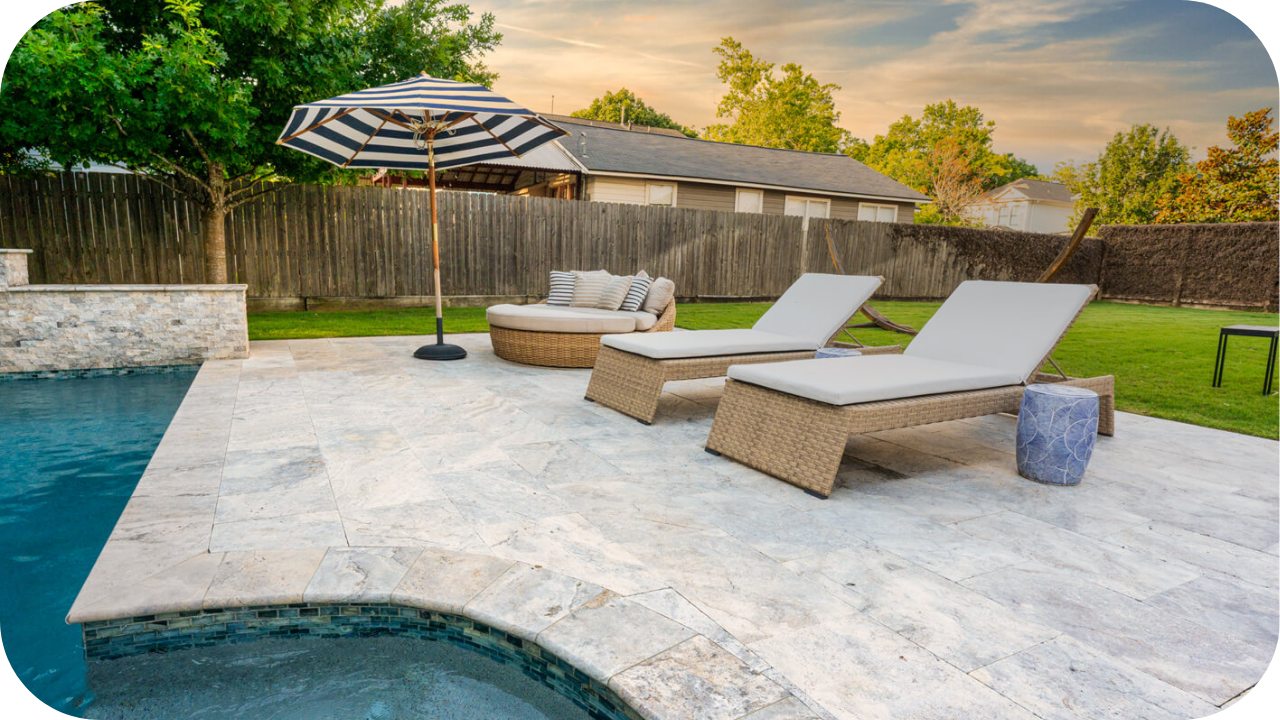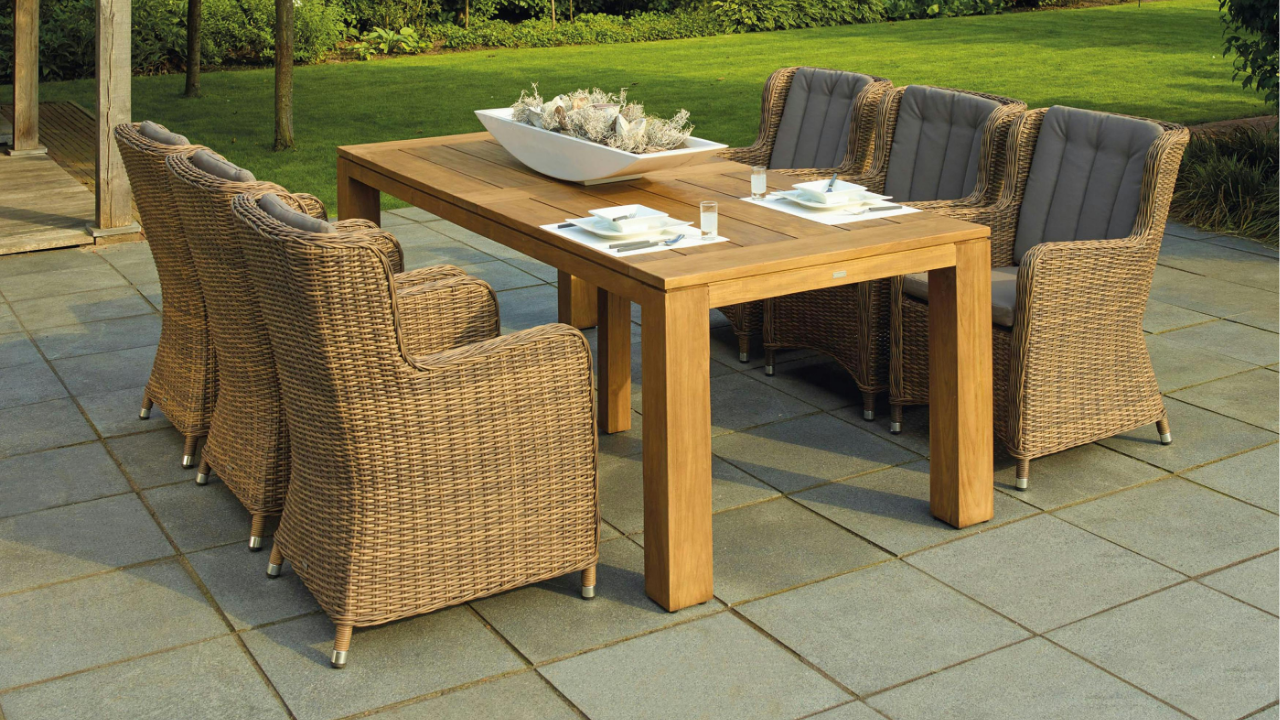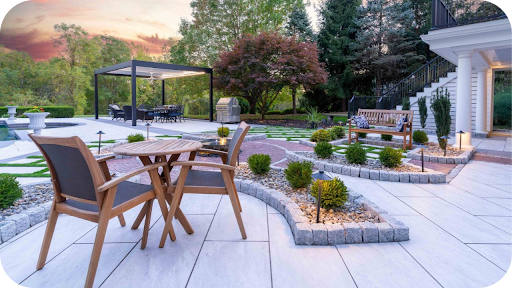
Pool coping is more than just a finishing touch. It plays an essential role in both safety and style around your swimming pool. Choosing the right material can greatly impact the look, feel, and functionality of your outdoor space.
Travertine is a standout natural stone often preferred for pool coping due to its timeless appeal and comfort underfoot.
This article covers the key benefits of travertine for pool coping, compares it with other materials, offers maintenance tips, and presents design options to enhance your pool area.
Benefits of Travertine for Pool Coping
Travertine is a standout choice for pool coping due to its durability, natural beauty, and functionality. Here are the key benefits of choosing travertine for your pool area.
1. Naturally Resistant to Water and Moisture Damage
Travertine’s porous surface naturally allows for water drainage, preventing pooling. When properly sealed, it resists moisture absorption, ensuring the longevity of the material, especially in areas prone to frequent wetness, such as pool decks.
2. Keeps Cool Underfoot in Hot Weather
Travertine remains comfortable to walk on even during the hottest summer days. Its porous structure helps dissipate heat, offering a cool, barefoot-friendly surface that’s perfect for pool decks and surrounding areas.
3. Durable and Resistant to Pool Chemicals
Travertine is naturally resistant to the effects of pool chemicals and saltwater exposure. With proper sealing, it remains durable, preventing degradation, cracking, or staining caused by chlorine and other harsh substances commonly found in pool areas.
4. Timeless Aesthetic Appeal
Travertine offers a classic, elegant look with its warm, natural tones and subtle textures. Available in various finishes, it enhances both contemporary and traditional pool designs, adding sophistication and value to outdoor spaces.
5. Low Maintenance and Easy to Care For
Once sealed, travertine requires minimal maintenance. Regular cleaning with mild detergent and water, along with periodic resealing, ensures its long-lasting beauty and functionality. It resists moss, algae, and staining, keeping your pool area looking pristine.
Travertine vs Other Pool Coping Materials
When selecting the best material for your pool coping, it’s important to weigh the pros and cons. Here’s how travertine compares to other leading pool coping options.
| Feature | Travertine | Concrete | Bluestone | Porcelain |
| Durability | Highly durable, resistant to cracking and chemicals | Prone to cracking and fading over time | Durable, but may crack under extreme pressure or weather | Long-lasting, but may fade and wear over time |
| Aesthetic Appeal | Offers elegant, timeless colours and natural textures | Basic appearance, limited design flexibility | Darker tones with a more rugged look, less variety | Sleek, modern finish, but lacks natural texture and variation |
| Heat Resistance | Remains cool to the touch, even in direct sunlight | Absorbs heat, becoming hot to the touch in summer | Absorbs heat and may be uncomfortable to walk on barefoot | Tends to retain heat, can be uncomfortable in the sun |
| Maintenance | Low maintenance when sealed, periodic resealing required | Requires regular sealing and repairs, especially cracks | Requires sealing and regular cleaning to maintain colour | Low maintenance, easy to clean, but may require sealing |
| Cost | Moderate to high depending on quality and finish | More affordable, but may require repairs over time | Higher upfront cost than concrete, but more durable | Generally more expensive, depending on the product and finish |
| Environmental Impact | Natural, eco-friendly material when locally sourced | Manufactured, with a higher environmental footprint | Natural stone, but quarrying can impact the environment | Manufactured, often with a higher carbon footprint |
Travertine Coping Profiles and Finishes
Selecting the right coping profile and finish is essential for achieving the ideal look. Here are the popular choices for travertine pool coping.
1. Bullnose Coping Profile
The bullnose coping profile features a rounded edge, offering a soft, classic look. This profile is ideal for creating smooth, elegant transitions around the pool, giving it a timeless, sophisticated appearance.
2. Drop-Face Coping Profile
The drop-face coping profile has a modern, square edge that drops down slightly, providing a clean, sharp finish. It’s perfect for creating a sleek, contemporary look that complements modern pool designs.
3. Square Edge Coping Profile
A square edge coping profile features a clean, straight edge that delivers a minimalist and modern aesthetic. This profile works well with contemporary pool designs, providing sharp lines and a structured, uniform look.
4. Tumbled Finish
The tumbled finish offers an aged, rustic look with rounded edges and a textured surface. This finish creates a weathered appearance that complements natural landscapes and traditional poolside designs, adding warmth and charm to outdoor spaces.
5. Honed Finish
The honed finish provides a smooth, matte surface that is soft to the touch. It creates a sleek, understated look while enhancing the natural colour and veining of travertine, ideal for modern, sophisticated pool coping designs.
6. Brushed Finish
The brushed finish has a textured surface that adds subtle detail and depth to the stone. This finish offers a contemporary feel while retaining the natural beauty of travertine, making it a great choice for poolside areas.
Design Ideas Using Travertine for Pool Coping
The right design can elevate your poolside space. Here are a few creative ways to incorporate travertine into your pool coping, ensuring it complements both functionality and aesthetics.
1. Laying Patterns for Travertine Pool Coping
Travertine offers versatile pattern options, including French pattern, straight lay and herringbone. These layouts provide different aesthetics, from clean and contemporary to classic and rustic, ensuring your poolside design complements your space.
2. Combining Travertine with Other Materials
Pairing travertine with materials like timber, gravel, or stone features adds contrast and depth. Combining different textures and colours enhances the pool area’s overall design while maintaining a cohesive, natural look.
3. Edge Profiles and Transitions
Choose from bullnose, drop-face, or square edge profiles to complement your pool style. Smooth transitions from coping to decking or water features ensure a seamless and polished appearance, adding a professional touch to your poolside design.
4. Incorporating Water Features with Travertine
Integrating water features like fountains or cascades with travertine creates a luxurious and serene environment. Travertine’s texture and colours pair beautifully with water elements, enhancing the pool’s aesthetics and creating a calming atmosphere.
5. Travertine for Poolside Seating Areas
Designing a poolside seating area with travertine creates a stylish and functional outdoor living space. Travertine’s durability and elegant appearance make it perfect for building seating walls, benches, or surrounding surfaces that elevate the pool area.
How to Maintain Travertine Pool Coping
To keep your travertine pool coping looking its best and performing well over time, follow these essential maintenance tips:
- Seal regularly to protect against moisture and stains: Apply a high-quality penetrating sealer every 1–2 years to prevent water absorption, chemical damage, and surface discolouration.
- Clean with ph-neutral products: Use gentle, ph-balanced cleaners with a soft mop or brush to remove grime without damaging the stone’s surface or finish.
- Inspect for cracks or shifting: Regularly check for small cracks or movement to catch issues early and avoid costly repairs or structural damage.
- Maintain proper drainage: Ensure the surrounding area slopes away from the pool to prevent standing water that can lead to staining, erosion, or mould growth.
- Re-grout when needed: Over time, grout may deteriorate—reapply weather-resistant grout to keep joints sealed and protect the stone from water intrusion.
- Avoid high-pressure washing: Use low-pressure water or gentle rinsing, as high-pressure cleaning can wear down or chip the travertine’s surface.
- Use furniture pads and avoid dragging items: Protect the coping by placing pads under furniture legs and lifting rather than dragging heavy items across the stone.
Conclusion
Travertine offers an ideal combination of beauty, durability, and functionality for pool coping. Its natural cooling properties, timeless elegance, and low maintenance make it a perfect choice for enhancing any pool area.
For expert advice and premium travertine options for your pool project, contact Splendour in Stone today. Let us help you transform your outdoor space with the perfect coping solution that will last for years to come.
More To Explore

Top 10 DIY Projects to Upgrade Your Backyard
More homeowners are paying attention to their outdoor spaces as backyards become important living areas. This shift highlights a desire for comfort, better use of

What Are the Best Permeable Pavers for Drainage?
Heavy rain can quickly turn a beautiful outdoor space into a frustrating pool of standing water. Many homes face similar drainage issues, especially in high-traffic


